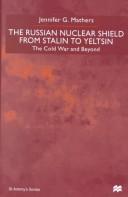| Listing 1 - 10 of 723 | << page >> |
Sort by
|
Book
ISBN: 1855215217 Year: 1995 Publisher: Aldershot : Dartmouth,
Abstract | Keywords | Export | Availability | Bookmark
 Loading...
Loading...Choose an application
- Reference Manager
- EndNote
- RefWorks (Direct export to RefWorks)
Book
ISBN: 9780815726647 9780815726654 9780815727446 Year: 2015 Publisher: Washington, D.C. Brookings Institution Press
Abstract | Keywords | Export | Availability | Bookmark
 Loading...
Loading...Choose an application
- Reference Manager
- EndNote
- RefWorks (Direct export to RefWorks)
Vladimir Putin's invasion of Crimea in March 2014 stunned the world. Shortly thereafter, the Russians threw their support behind secessionist rebels in neighboring Ukraine, pitching the country into a brutal and continuing civil war. An ominous and sharp deterioration in East-West relations followed. The author brings here to life the geography, power politics, and history of Ukraine - once known as Kieven Rus', or the 'first Russia'. He takes a critical look at the tortured history of post-Soviet Russia and Ukraine, and journeys deep into the Russian past to uncover the roots of Russian and Ukrainian nationalism. The author maintains that world order hangs on a resolution of the Ukraine crisis, and he makes the provocative argument that the only sensible solution lies in both Russia and Ukraine recognizing that their futures are irrevocably intertwined. Any realistic solution must take into account the national interests of both nations. The West can approve or disapprove, but the two countries must reach their own modus vivendi. This is a time for realpolitik; and if the West continues to intrude into this delicate game of diplomatic shadow-boxing, the effort will very likely collapse.
Polemology --- Russian Federation --- Ukraine --- PolemologyRussian Federation --- Russia
Book
ISBN: 0815709269 Year: 1982 Publisher: Washington, D.C. Brookings Institution
Abstract | Keywords | Export | Availability | Bookmark
 Loading...
Loading...Choose an application
- Reference Manager
- EndNote
- RefWorks (Direct export to RefWorks)
Polemology --- Russian Federation --- PolemologyRussian Federation --- Russia

ISBN: 0333737423 Year: 2000 Publisher: Basingstoke Macmillan
Abstract | Keywords | Export | Availability | Bookmark
 Loading...
Loading...Choose an application
- Reference Manager
- EndNote
- RefWorks (Direct export to RefWorks)
Polemology --- Russian Federation --- PolemologyRussian Federation --- Russia
Book
ISBN: 0891589066 Year: 1982 Publisher: Boulder, Colo.
Abstract | Keywords | Export | Availability | Bookmark
 Loading...
Loading...Choose an application
- Reference Manager
- EndNote
- RefWorks (Direct export to RefWorks)
Polemology --- Russian Federation --- PolemologyRussian Federation --- Russia
Book
ISBN: 1903584957 Year: 2002 Publisher: Camberley, UK : Conflict Studies Research Centre,
Abstract | Keywords | Export | Availability | Bookmark
 Loading...
Loading...Choose an application
- Reference Manager
- EndNote
- RefWorks (Direct export to RefWorks)
Book
ISBN: 9781472465412 9781315568423 9781317177050 Year: 2017 Publisher: London ;New York, N.Y. Routledge is an imprint of the Taylor & Francis Group, an Informa Business
Abstract | Keywords | Export | Availability | Bookmark
 Loading...
Loading...Choose an application
- Reference Manager
- EndNote
- RefWorks (Direct export to RefWorks)
Post-communist Russia is an instance of the phenomenon of authoritarian modernization project, which is perceived as a set of policies intended to achieve a high level of economic development, while political freedoms remain beyond the current modernization agenda or are postponed to a distant future. Why did Russia (unlike many countries of post-communist Europe) pursue authoritarian modernization after the Soviet collapse ? What is the ideational agenda behind this project and why does it dominate Russia's post-communist political landscape ? What are the mechanisms of political governance, which maintain this project and how have they adopted and absorbed various democratic institutions and practices ? Why has this project brought such diverse results in various policy arenas, and why have the consequences of certain policies become so controversial ? Why, despite so many controversies, shortcomings and flaws, has this project remained attractive in the eyes of a large proportion of the Russian elite and ordinary citizens ? This volume intends to place some of these questions on the research agenda and propose several answers, encouraging further discussion about the logic and mechanisms of the authoritarian modernization project in post-communist Russia and its effects on Russia's politics, economy, and society.
Book
ISBN: 9781003131588 1003131581 9781000352771 1000352773 9781000352696 1000352692 9781000352733 1000352730 9780367653248 0367653249 Year: 2021 Publisher: Routledge
Abstract | Keywords | Export | Availability | Bookmark
 Loading...
Loading...Choose an application
- Reference Manager
- EndNote
- RefWorks (Direct export to RefWorks)
This book explores how far messianism, the conviction that Russia has a special historical destiny, is present in, and affects, Russian foreign policy. Based on extensive original research, including analysis of public statements, policy documents, and opinion polls, the book argues that a sense of mission is present in Russian foreign policy, that it is very similar in its nature to thinking about Russia's mission in Tsarist times, that the sense of mission matters more for Russia's elites than for Russia's masses, and that Russia's special mission is emphasised more when there are questions about the regime's legitimacy as well as great power status. Overall, the book demonstrates that a sense of mission is an important factor in Russian foreign policy.
Book
ISBN: 0933074026 Year: 1980 Publisher: Washington D.C. Advanced International Studies Institute
Abstract | Keywords | Export | Availability | Bookmark
 Loading...
Loading...Choose an application
- Reference Manager
- EndNote
- RefWorks (Direct export to RefWorks)
Polemology --- Russian Federation --- Russia
Book
ISBN: 3896843605 Year: 2005 Publisher: Hamburg edition Körber-Stiftung
Abstract | Keywords | Export | Availability | Bookmark
 Loading...
Loading...Choose an application
- Reference Manager
- EndNote
- RefWorks (Direct export to RefWorks)
| Listing 1 - 10 of 723 | << page >> |
Sort by
|

 Search
Search Feedback
Feedback About UniCat
About UniCat  Help
Help News
News